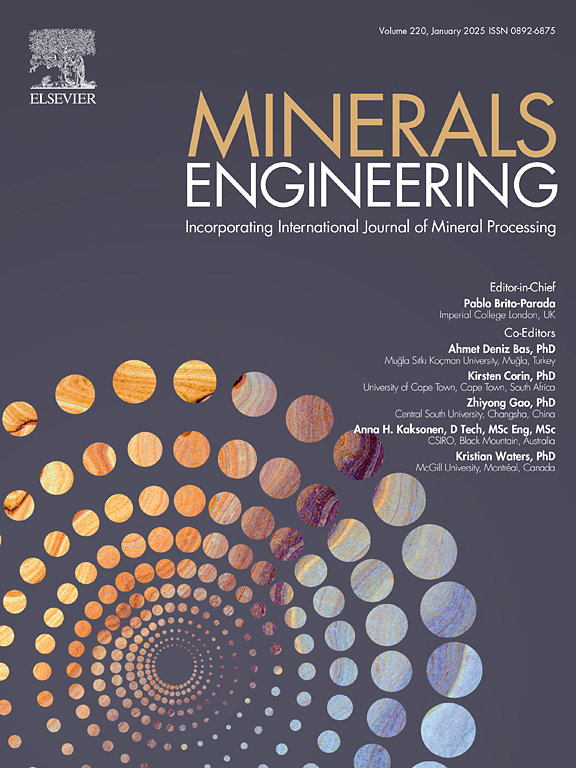Coal-based reduction roasting and magnetic separation of low-grade Botswana iron ore for sustainable beneficiation
IF 4.9
2区 工程技术
Q1 ENGINEERING, CHEMICAL
引用次数: 0
Abstract
This study demonstrates a novel pathway to beneficiate low-grade hematite-rich iron ore (56.1 % Fe) from Botswana’s Ikongwe deposit through coal-based magnetizing roasting and low-intensity magnetic separation (LIMS). Leveraging Botswana’s underutilized resources, Morupule non-coking coal (50.01 % fixed carbon, 21.13 % ash) was utilized as a sustainable reductant. A Taguchi L9 orthogonal array systematically optimized critical parameters: roasting temperature (700–900 °C), residence time (30–90 min), and coal dosage (25–50 %). Optimal conditions (800 °C, 60 min, 50 % coal dosage) yielded a magnetic concentrate grading 68.2 % Fe at 85.7 % recovery, representing a 21.6 % relative iron upgrade. Advanced characterization (XRD, SEM-EDS) confirmed efficient phase transformation from hematite to magnetite with concurrent gangue reduction. Kinetic modelling indicated a chemically controlled reaction mechanism, with activation energies ranging from 159.1 to 160.6 kJ/mol. Thermodynamic evaluation revealed negative Gibbs free energy values (ΔG), supporting the spontaneity of the reduction reactions across the tested temperatures. This integrated approach validates the technical and economic feasibility of utilizing Botswana’s local resources to valorise low-grade iron ore, offering a viable route for Botswana to enhance its mineral-based industrialization and to reduce reliance on imported ferrous materials.

低品位博茨瓦纳铁矿石煤基还原焙烧—磁选可持续选矿
本研究为博茨瓦纳Ikongwe矿床低品位富赤铁矿(56.1%铁)的煤基磁化焙烧-弱磁选(LIMS)选矿提供了一条新途径。利用博茨瓦纳未充分利用的资源,Morupule非炼焦煤(50.01%固定碳,21.13%灰分)被用作可持续还原剂。采用田口L9正交法系统优化了焙烧温度(700 ~ 900℃)、停留时间(30 ~ 90 min)、煤投加量(25 ~ 50%)等关键参数。最佳条件(800°C, 60分钟,50%煤用量)产生的磁精矿铁品位为68.2%,回收率为85.7%,相对铁品位为21.6%。高级表征(XRD, SEM-EDS)证实了赤铁矿向磁铁矿的有效相变,并伴有脉石还原。动力学模拟表明该反应为化学控制反应,活化能在159.1 ~ 160.6 kJ/mol之间。热力学评价显示负的吉布斯自由能值(ΔG),支持在测试温度下还原反应的自发性。这一综合办法证实了利用博茨瓦纳当地资源使低品位铁矿石增值的技术和经济可行性,为博茨瓦纳加强其矿物基工业化和减少对进口铁材料的依赖提供了一条可行的途径。
本文章由计算机程序翻译,如有差异,请以英文原文为准。
求助全文
约1分钟内获得全文
求助全文
来源期刊

Minerals Engineering
工程技术-工程:化工
CiteScore
8.70
自引率
18.80%
发文量
519
审稿时长
81 days
期刊介绍:
The purpose of the journal is to provide for the rapid publication of topical papers featuring the latest developments in the allied fields of mineral processing and extractive metallurgy. Its wide ranging coverage of research and practical (operating) topics includes physical separation methods, such as comminution, flotation concentration and dewatering, chemical methods such as bio-, hydro-, and electro-metallurgy, analytical techniques, process control, simulation and instrumentation, and mineralogical aspects of processing. Environmental issues, particularly those pertaining to sustainable development, will also be strongly covered.
 求助内容:
求助内容: 应助结果提醒方式:
应助结果提醒方式:


